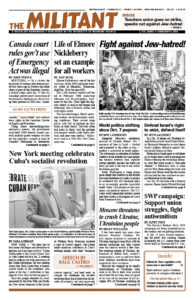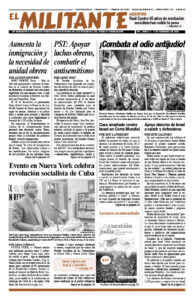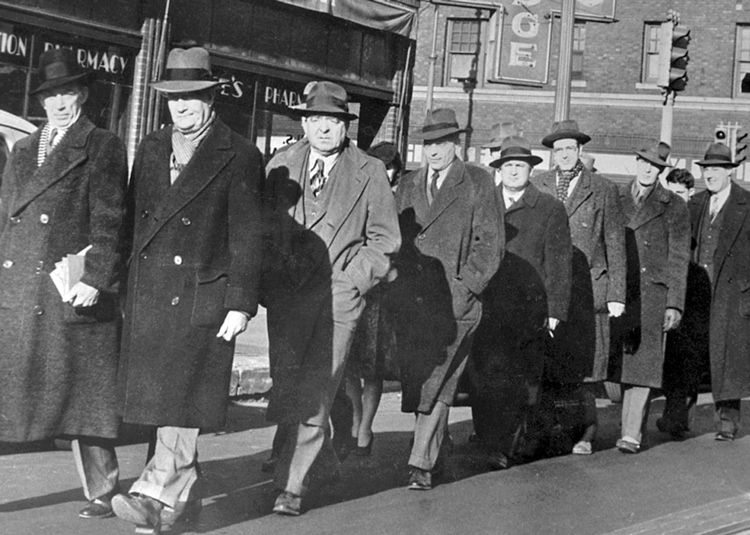This excerpt is from The Struggle for a Proletarian Party by James P. Cannon. It is one of Pathfinder’s Books of the Month for January. The book records the fight to build a party, proletarian in program and composition, that can lead working people to topple capitalist rule in the U.S. It was written as part of the political battle led by Leon Trotsky against a petty-bourgeois opposition in the Socialist Workers Party. Trotsky’s companion volume is In Defense of Marxism. Under the pressure of the approaching second imperialist world war, the opposition and its central leader, James Burnham, recoiled from the party’s proletarian course. Cannon was a founder of the communist movement in the U.S. and national secretary of the SWP from 1938 to 1953. Copyright © 1972 by Pathfinder Press. Reprinted by permission.
The fundamental conflict between the proletarian and the petty-bourgeois tendencies expresses itself at every turn in questions of the party organization. But involved in this secondary conflict are not little incidents, grievances, personal friction, and similar small change which are a common feature in the life of every organization. The dispute goes deeper. We are at war with Burnham and the Burnhamites over the fundamental question of the character of the party. Burnham, who is completely alien to the program and traditions of Bolshevism, is no less hostile to its “organizational methods.” He is much nearer in spirit to Souvarine and all the decadents, skeptics, and renegades of Bolshevism than to the spirit of Lenin and his terrible “regime.”
Burnham is concerned first of all with “democratic guarantees” against degeneration of the party after the revolution. We are concerned first of all with building a party that will be capable of leading the revolution. Burnham’s conception of party democracy is that of a perpetual talking shop in which discussions go on forever and nothing is ever firmly decided. … Consider his “new” invention — a party with two different public organs defending two different and antagonistic programs! Like all the rest of Burnham’s independent ideas, that is simply a plagiarism from alien sources. …
Our conception of the party is radically different. For us the party must be a combat organization which leads a determined struggle for power. The Bolshevik party which leads the struggle for power needs not only internal democracy. It also requires an imperious centralism and an iron discipline in action. It requires a proletarian composition conforming to its proletarian program. The Bolshevik party cannot be led by dilettantes whose real interests and real lives are in another and alien world. It requires an active professional leadership, composed of individuals democratically selected and democratically controlled, who devote their entire lives to the party, and who find in the party and in its multiform activities in a proletarian environment, complete personal satisfaction.
For the proletarian revolutionist the party is the concentrated expression of his life purpose, and he is bound to it for life and death. He preaches and practices party patriotism, because he knows that his socialist ideal cannot be realized without the party. In his eyes the crime of crimes is disloyalty or irresponsibility toward the party. The proletarian revolutionist is proud of his party. He defends it before the world on all occasions. The proletarian revolutionist is a disciplined man, since the party cannot exist as a combat organization without discipline. When he finds himself in the minority, he loyally submits to the decision of the party and carries out its decisions, while he awaits new events to verify the disputes or new opportunities to discuss them again.
The petty-bourgeois attitude toward the party, which Burnham represents, is the opposite of all this. The petty-bourgeois character of the opposition is shown in their attitude toward the party, their conception of the party, even in their method of complaining and whining about the “grievances,” as unfailingly as in their light-minded attitude toward our program, our doctrine, and our tradition.
The petty-bourgeois intellectual, who wants to teach and guide the labor movement without participating in it, feels only loose ties to the party and is always full of “grievances” against it. The moment his toes are stepped on, or he is rebuffed, he forgets all about the interests of the movement and remembers only that his feelings have been hurt; the revolution may be important, but the wounded vanity of a petty-bourgeois intellectual is more important. He is all for discipline when he is laying down the law to others, but as soon as he finds himself in a minority, he begins to deliver ultimatums and threats of split to the party majority.
The leaders of the opposition are running true to type. Having recited the whole dolorous catalogue of their petty and inconsequential and mostly imaginary grievances; having been repulsed by the proletarian majority in their attempt to revise the program; having been called in sociological and political terms by their right names — having “suffered” all these indignities — the leaders of the opposition are now attempting to revenge themselves upon the party majority by threats of split. That will not help them. It will not prevent us from characterizing their revisionist improvisations, and showing that their attitude on the organization question is not disconnected from their petty-bourgeois conceptions in general, but simply a secondary expression of them.
Organization questions and organizational methods are not independent of political lines, but subordinate to them. As a rule, the organizational methods flow from the political line. Indeed, the whole significance of organization is to realize a political program. In the final analysis there are no exceptions to this rule. It is not the organization — the party or group — which creates the program; rather it is the program that creates the organization, or conquers and utilizes an existing one. Even those unprincipled groups and cliques which have no program or banner of their own, cannot fail to have a political program imposed upon them in the course of a struggle.


